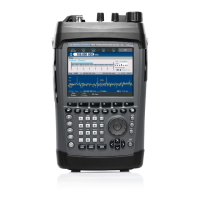TRACe|DATA
. :UDP
. . :TAG
. . . [:ON] <ip-address> , <ip-port>, <tag> {, <tag>...}
Sets a UDP-address and adds the specified tags that determine what data is
included in traces. If the maximum number of UDP addresses (TRACe:UDP?
MAX) has been reached an error is generated: -310, “Maximum number of
UDP addresses exceeded”.
In case a tag is added to a UDP address that has flags that are incompatible
with this tag (e.g. “FSTRength” flag and AUDio tag), these flags are ignored
for those tags.
Parameters:
<ip-address> string representing IP dot notation of IP address (e.g.
172.17.75.18)
<numeric_value> integer port number in the range [0,65535] (16 bit)
<tag> See Table 19 for tags in Section 12.1.
Remark:
If the UDP-address is not in the list, it is added to it. Otherwise, it is modified
*RST state:
The “*RST” command has no effect on these settings.
After a power down, the UDP-address list only contains the default entry
(index 0). The default is retained.
Example:
TRACe:UDP:TAG:ON “123.456.789.012”, 5555, MSC, FSC
12 UDP Data Streams
This chapter describes the data streams that can be output by the Orion MR.
All data streams have a similar (general) structure, which is described in
Section 12.1. After that, each data stream is described in a separate section.
12.1 Stream Packet Structure
Each stream consists of a number of UDP packets, and each packet has a
similar structure that is shown in Table 18. The first (light grey) part is the
common header which is the same for all stream types. Its <attribute tag>
determines the stream type, and its <trace selector flags> determines what
data are included.
The <optional header> and the <trace data> are different for each stream
type. Each stream type is further described in a separate section.
The <trace selector flags> shown in Table 20 define the data items that are
included in a data stream. The Orion MR does not support all data items that
the ESMB version of its predecessor, the EB200, supported. The following
items are not supported: AM, AM_POS, AM_NEG, FM, FM_POS, FM_NEG,
PM, and BANDWIDTH.

